Obama shows a strong commitment to the drone programme
- Published
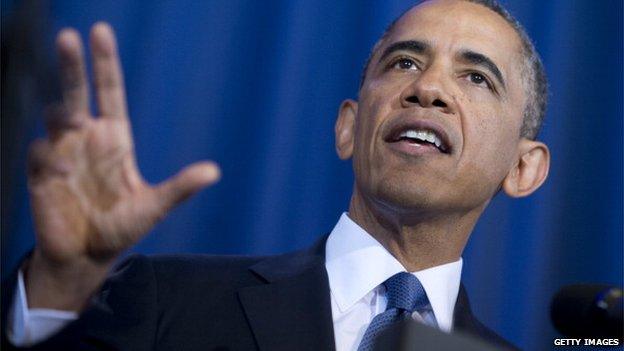
Obama defended the drones while acknowledging civilian deaths "will haunt us"
The CIA-directed drone strikes are increasingly unpopular. In response, US President Barack Obama has brought targeted killings out of the shadows - but just a bit.
On US soil, no American can be killed without due process, whether with "a drone, or a shotgun", Mr Obama said on Thursday.
For Americans living abroad "to wage war against America", however, the situation is different.
In his national security speech in Washington DC, Mr Obama said that an American overseas who was "actively plotting to kill US citizens", as well as anyone else who posed a threat to US citizens, could be eliminated with a drone.
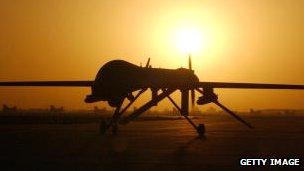
Mr Obama says that drones, such as the Predator, are effective at fighting terrorists
The drone strikes are part of a legitimate campaign against terrorists - the killings are "legal" and "just", he said.
The speech marked the first time that Mr Obama had spoken expansively about the drone programme.
It showed his commitment to the strategy - one that he was defending in the midst of criticism in the US and abroad.
Reassuring critics
The strikes are one of the most controversial aspects of US counter-terrorism. In his speech, Mr Obama tried to take away some of the mystery and emotion.
Mr Obama described the drone programme in measured tones, at times sounding like a lawyer considering a legal argument.
Mr Obama offered a cost-benefit analysis, weighing morality, effectiveness and other factors.
"It is a hard fact that US strikes have resulted in civilian casualties," he said, adding, "these deaths will haunt us."
"But as commander-in-chief I must weigh these heartbreaking tragedies against the alternative," he said.
"To do nothing in the face of terrorist networks would invite far more civilian casualties."
Mr Obama has signed off on more than 350 strikes against al-Qaeda and allied groups in Pakistan.
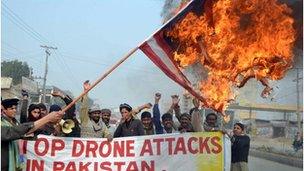
Drone strikes are deeply resented in Pakistan
That is more than six times the number of attacks carried out during the years that President George W Bush was in the White House, according to the New America Foundation, external.
In addition, strikes have been carried out in Afghanistan, Yemen and other countries.
The programme is unpopular abroad. A May 2013 Pew Research Center poll, external found two-thirds of Pakistanis opposed the drone strikes.
In addition, legal experts have criticised the programme.
Guidelines for killing
"It involves the use of force on the territory of another state without its consent," UN special rapporteur on human rights and counter-terrorism Ben Emmerson said in March, "and is therefore a violation of Pakistan's sovereignty."
In response to his critics, Mr Obama has tried to make the programme look better. He has, for example, imposed new guidelines for determining targets.
Previously, a non-US citizen could be killed by a strike if he or she posed a "significant" threat to the US, according to legal experts.
In contrast, the requirements for killing an American were more limited - he or she had to pose an "imminent" threat.
'Bar is raised'
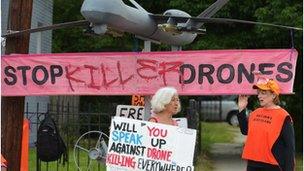
Critics say the drones kill civilians
Now, regardless of nationality individuals can be killed by a strike only if they pose a "continuing and imminent threat" to the US.
For an ordinary person, the distinction may seem minor. For legal experts, however, it matters.
"The bar has been raised," says John Bellinger, state department legal adviser under the Bush administration from 2005-09.
Mr Bellinger said the new guidelines were designed to mollify critics. He is well-versed in this area.
He once defended controversial White House policies in meetings in Europe and in other parts of the world.
"I sympathise," Mr Bellinger said. "I know what it's like when things have not gone as well as you'd like in the first term and you have to struggle to fix them."
In his second term, Mr Obama has fought to defend the drone programme. In his speech he made it clear he intended to continue to use the strikes.
Kenneth Anderson, a professor of international law at American University, gives the president a high mark for his speech.
"Our European allies don't think that we've got the right legal principles to start with," Mr Anderson said.
"But I think they can live with this if they feel that there are rules limiting how the US uses its drones - that it's not just whatever the president feels like doing."
Increased transparency
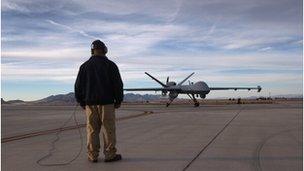
Predator drones are used to target militants
Mr Obama is attempting to signal "to the international audience that this is not the Wild West - that there is some method and logic", said Amos Guiora, the Jerusalem-based author of Legitimate Target.
Mr Guiora said Obama had not been discriminating enough in his selection of targets.
In a similar vein, Micah Zenko of the Council on Foreign Relations said the drone programme was flawed.
Mr Zenko said the speech was an attempt to protect the right to use the drone strikes with as little scrutiny as possible.
The reason is simple - Obama administration officials saw what happened to the Bush White House team, he said.
"They lost their ability to do renditions and torture," Mr Zenko said.
Obama White House officials hope to avoid the same fate regarding the drones, Mr Zenko said.
"The whole objective of selective transparency is so they do not lose the ability to use the strikes," he said.
In his speech Mr Obama said the drone programme had rules: "America cannot take strikes wherever we choose."
After the speech Americans and people abroad have a better understanding of how the drone programme works and who may be targeted - and why.
Yet much about the programme remains under wraps - and is likely to stay that way for years.
- Published24 May 2013